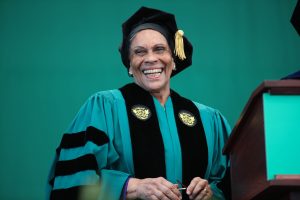Special education scholar Beth Harry G’89 responded to the birth of her daughter, Melanie—who had cerebral palsy—by starting a school for children with disabilities in Trinidad and Tobago in 1976. When Melanie died unexpectedly in 1981, her mother continued in the school until 1986, when she came to Syracuse to pursue a Ph.D. in special education. The Immortelle Center for Special Education still operates in Trinidad, more than 40 years after Harry founded it.

“Once I entered the world of disabilities, I found that I could not open just one door, because each door led to another, and another, until I found myself living in an entirely new household,” Harry told graduates of Lesley University’s Graduate School of Education and Graduate School of Arts and Sciences in May 2019. She received an honorary doctorate from Lesley at commencement.
She advised the Lesley graduates that what may seem to be an ending can be transformed into a beginning. For Harry, her daughter’s life and untimely death began a career devoted to special education.
Harry is a professor of special education at the University of Miami whose research has focused on the impact of special education on children and families from diverse cultural and linguistic backgrounds, including African American and Puerto Rican. She received bachelor’s and master’s degrees at the University of Toronto and a Ph.D. from the School of Education.
In 2002, she served as a member of the National Academy of Sciences’ panel to study the disproportionate placement of minority students in special education. In 2003 she received a Fulbright award to do research on Moroccan children’s schooling in Spain.
Her research has resulted in five books: Building Cultural Reciprocity with Families (1999), Case Studies of Minority Student Placement in Special Education (2007) and Why Are So Many Minority Students in Special Education? (2014). Her memoir about her daughter’s life, Melanie, Bird with a Broken Wing: A Mother’s Story, was published in 2010, and in fall 2019 she will bring her work full circle by publishing a study of the school she started in Trinidad, Childhood Disability, Advocacy and Inclusion in the Caribbean: A Trinidad and Tobago Case Study.
From 2010 to 2015 she led the revamping of Miami’s undergraduate education program to prepare students for special and general education simultaneously.
“The approach we developed is similar to the blended program that has been in place at Syracuse University for several decades,” Harry says. “I believe that this is the way to go because teachers need to be prepared for the wide diversity of students they will meet in their K-12 classrooms.”
She identifies two key issues in special education today: the continuing inappropriateness of high rates of placement of minorities in disability categories based on clinical judgment, and how to make the philosophy of inclusive education work effectively for students who need specialized assistance and instruction.
The most helpful approach, she says, is Response to Intervention (RTI), which evaluates students’ progress by teaching and then testing what has been taught, rather than using standardized testing. “If you really want to know how students are learning, you have to be sure that you are testing something they have had the opportunity to learn,” Harry says.
This article originally appeared in the 2019 issue of Education Exchange Magazine
